#umi zatou
Explore tagged Tumblr posts
Text
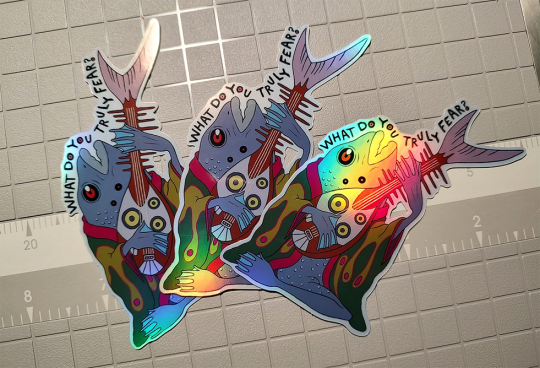
Umi Zatou holographic stickers! Still needing a few tweaks, but will be available in my Etsy shop soon.
#mononoke 2007#kusuriuri#umi zatou#mononoke merch#despite my best efforts the video does not do justice to the way the holographic effect makes his eyes stare into your soul
78 notes
·
View notes
Text
Hey also, can anyone shoot me some info on some interesting sea-based yokai (that aren't umi bozu or funayuurei/ayakashi or umi zatou, and probably not one of the royal dragons either)? I was going through yokai.com trying to find some but I wasn't really finding much there that I could point to and say "yeah I can work with this" (probably because there are a lot of options to choose from but going through them one by one was getting dull after a while)
I need five (and one of them I don't think will need to be sea-based necessarily but the other four do)
It's the last piece of planning holding me back from starting to write this one fic
4 notes
·
View notes
Text
Genyousai: I fear pastries the most, ahaha!
Umi zatou: YOU THINK THIS IS
Umi zatou: A MOTHERFUCKING GAME?!?
2 notes
·
View notes
Text



Demonic Singing Big Mouth Billy Bass stickers now available!
45 notes
·
View notes
Text

Achievement Unlocked: Indoctrinated my sister.
#mononoke#umi bozu#she asked if the umi zatou would come back#couldn't tell if she wanted him to or not#(she's a pharmacy tech that's why she's counting pills)
44 notes
·
View notes
Text
In all seriousness, I think the Medicine Seller's assertion at the end of the first "Bakeneko" that "no one has the right to restrain or order someone around" (sometimes less specifically translated as "control another person") is intentionally refuted as an absolute principle in "Umi Bozu."
The Medicine Seller lets Kayo basically boss him around for the whole arc, and he seems to recognize the value of that - mostly, I think, because there are many hints throughout the arc that he's at a place where he feels pretty directionless. He even seems unsure that he should continue slaying mononoke.
1) He asks Kayo why he should.
2) He says at one point that he's still a Medicine Seller - a hint that he's either considering or expecting not to be one much longer.
3) He doesn't answer Kayo when she asks if he came to slay the mononoke.
4) He seems barely willing to open the hollow boat.
5) He doesn't even seem all that interested in where the ship is going, or in the humans around - except for Kayo.
He seems to be in need of some grounding, something Kayo's forceful influence repeatedly provides. She's confident he should keep slaying mononoke. She tells him to put less distance between himself and humans (and her). She gets him up on deck to face the umi zatou; she gets him to open the boat; she reminds him why the mononoke need to be slain.
Kayo also needs the Medicine Seller's influence. He even has to physically restrain her to stop her from panicking post-hallucination, something that would leave her in severe distress if not physical danger if he didn't stop it. She might also have been overwhelmed by the fear the umi zatou showed her, had the Medicine Seller not snapped her out of the delusion.
His relationship with her must show him that forceful action over others can be right - that sometimes it's necessary to guide someone or help them. In fact, he can't really continue his journey without it. He certainly could not get through to Ochou, or fight off the Nopperabou, much less slay Ochou or deal with the men in "Nue."
Connected to Kayo's influence is her association with balance. She has an affinity with the Medicine Seller's scales, and her personality offsets his; she is his balancing force. She restores balance to what he might otherwise have continued to hold as an absolute belief, which would have prevented him from exerting any influence over humans or the mononoke.
Her pull over the Medicine Seller gives him direction again and brings him back into contact with humanity, and back to a place where he can be sure of what he's doing and continue.
#mononoke 2007#kusuriuri#kayo#mononoke theory#anyway things like this are why I ship them so hard#he seems so cool all the time but he is in *trouble* in that arc#he needs his girl
74 notes
·
View notes
Text
@seekingskywhales asked me to talk about Sasaki, so here are my theories on this weirdo, rendered as coherently as possible.
Like most of my other Mononoke theories, the ones on Sasaki are based on the premise that everyone and everything in Mononoke is connected to the Medicine Seller.
Evidence of Sasaki's connection to the Medicine Seller:
He's associated with swords, the colors of his clothes are similar to those of the Medicine Seller's sword (dark red, bright red, green), and he's particularly fixated on the Medicine Seller's sword.
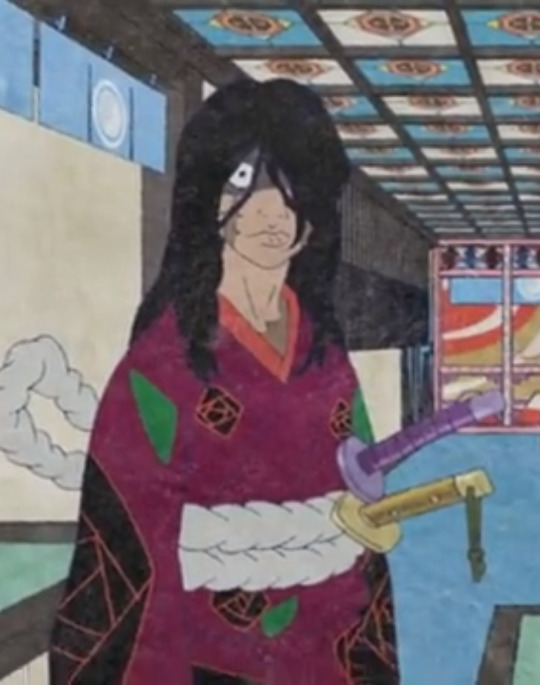

The eye images that appear on the hands that emerge from his sword and then on the sword blade before it breaks are a very similar color and pattern to the eye images on the Medicine Seller's clothes. The Umi Zatou's eyes also change to this color.
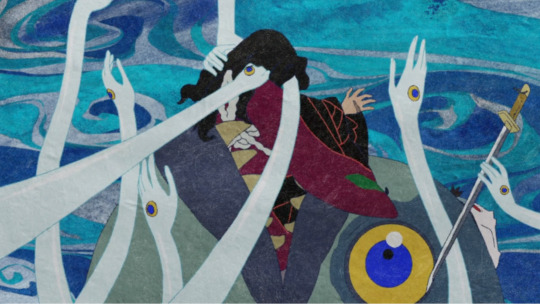
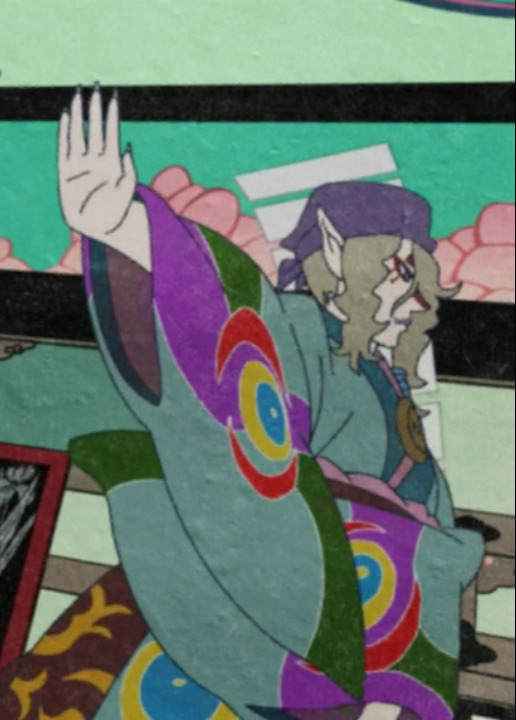
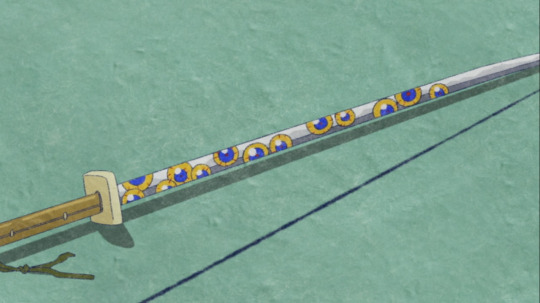
His name has no apparent meaning but could be a fusion of "Tamaki" and "Sakai," the names of two characters that are significant parts of the Medicine Seller's memories.
There's also evidence that what happens to Sasaki is connected to what happens to Genkei at the end of "Umi Bozu."
Evidence of Sasaki's connection to Genkei and Oyou
Sasaki is weirdly fixated on Oyou when she appears. Apart from Genkei, he seems to be the only one who actually sees her.
Genkei's merging with Oyou occurs just before one half of Sasaki's broken sword appears to merge with him through his eye.
I interpret these connections this way:
Connections to the Medicine Seller's sword: The Medicine Seller's sword contains a part of him, his "other self"; it's even implied in this arc that the sword is alive. Genyousai also remarks that tools and objects have souls. The Medicine Seller also implies elsewhere that the sword may actually be him:
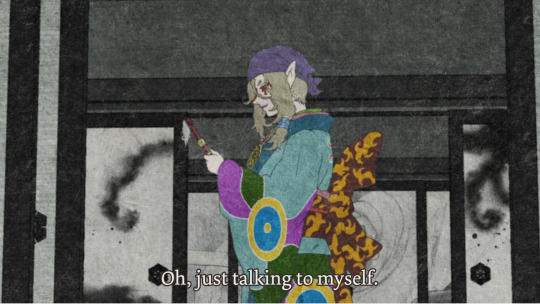
A figure of speech, maybe. Maybe not.
Sasaki could embody part of the life within the Medicine Seller's sword, a part of his psyche, and what goes on with him could represent what goes on in that psyche.
Connections to the eye images: The association of the eye images with Sasaki's victims and with the sword blade suggest the people Sasaki has killed were somehow part of the Medicine Seller, and that those people still haunt the sword as they haunt Sasaki. Because they're eye images, they could appear on the blade because of an emerging awareness of what's happening in Sasaki's mind. That awareness causes the sword to break.
Connections to Tamaki and Sakai: The implication of these names suggests that Sasaki's mental instability and violence are linked back to the violence between Tamaki and Sakai in "Umi Bozu." Sasaki could embody the memory of that violence and/or a reaction to it.
Connections to Genkei and Oyou: Sasaki responds to Oyou as if she's significant to him, but as far as we know she is only significant to Genkei. But, Genkei's fusion with Oyou nearly co-occurs with Sasaki's fusion with something we know was important to him—one half of his broken sword. The suggestion is that those fusions are interdependent, and what Oyou meant to Genkei may be mirrored by what that half of the sword meant to Sasaki.
What about the other half of the sword?
The first half of Sasaki's sword fused with him because Oyou fused with Genkei—because the Oyou mononoke was exorcised. The other half of the sword is most likely another part of Sasaki that he hasn't merged with. There's a duplicate of Sasaki at the end of "Umi Bozu" because he's split into two halves: the half of him that he's merged with and the half of him that he hasn't. Since those halves are part of him, they're also both him.
The "Umi Bozu" arc ends with Sasaki still fixated on the broken sword, and there's no resolution of his fragmentation. But if...
(1) Sasaki embodies a conflict within the Medicine Seller, and (2) the parts of those conflicts come out as mononoke, and (3) everything in Mononoke connects back to the Medicine Seller...
...then the second half of Sasaki could be the next mononoke the Medicine Seller meets, Ochou.
And I'll point out here that the similarity of the names Oyou and Ochou also suggests a connection between them (and also to Kayo, but that's a whole other analysis).
I've also written an analysis of sorts on the Medicine Seller's connection with Ochou.
Accepting all of these premises, what do Sasaki's existence and actions actually mean?
If Sasaki is part of the Medicine Seller and has also been killing parts of the Medicine Seller, then Sasaki's victims are not really other people; they're other parts of the same whole. Sasaki has been attacking himself.
The same is true of Genkei and Ochou, most explicitly of Ochou. Genkei and Ochou both perceived a problem outside of themselves and reacted with hostility that turned out to harm only them. The identity that Genkei saw as a threat, pushed away, and allowed to die was a vital part of him. The people that Ochou killed were her own thoughts and feelings.
I think that Sasaki embodies all of this internalized violence, which the Medicine Seller's psyche created out of the events of A. "Bakeneko." Genkei/Oyou and Ochou/the Nopperabou are the component parts of that violence, the feelings and identities that lie beneath it and fuel it. Sasaki, Genkei, and Ochou all reveal that their violence is self-violence, something they can't understand because their identities are fragmented: They imagine parts of themselves as external enemies.
This fragmentation can go two ways: It can either continue in the direction it's been going up to the point where Sasaki appears, or it can be reversed. If it continues, the identities of Sakai and Tamaki will eventually re-emerge from components of every story we see in Mononoke. If it's reversed, a different outcome will emerge. The purpose of the Medicine Seller's intervention with Genkei, Ochou, and everyone else is to reverse the chain of karma that's led up to this point by re-integrating them all.
Once the components of Sasaki's violence are separated from each other (the broken sword) and then understood (the exorcism of the mononoke), they reintegrate with him (the dissolution of the first half of the sword), which will ultimately allow him to re-integrate with himself. The undoing of Sasaki's mental fragmentation is also the undoing of the fragmentation within the Medicine Seller's psyche —its re-integration into the sword, and its re-integration with him.
#mononoke 2007#kusuriuri#mononoke theory#umi bozu#nopperabou#basically the premise of mononoke is that the medicine seller is a parent whose kids are running around setting fire to things#and he's trying to catch them all before they burn down the fucking church#AGAIN
75 notes
·
View notes
Text
Umi Zatou and Kusu with cat stickers are back in stock in my Etsy shop!
#mononoke#kusuriuri#etsy#stickers#I wanna do kon kusu stickers too but I need to get his vibes down before I can draw him ya know?#it feels like he's 50% cool 50% spaz and I'm gonna need to see the movie to see how that manifests
5 notes
·
View notes
Text
I gotta be honest: I love the Umi Zatou. Just one banjo-playing fish guy trying to do his job and everybody's down on him.
20 notes
·
View notes
Text
In relation to my thoughts on Moriya from the "Bakeneko" arc, here are a couple of interesting passages from Jiddu Krishnamurti's Freedom from the Known:
"There is only total fear, but how can the mind which thinks in fragments observe this total picture? We have lived a life of fragmentation, and can look at that total fear only through the fragmentary process of thought. ... Therefore we see that the mind can look at this total fear only when there is no movement of thought."
Thought, Krishnamurti says, is created by memory, and fear is dependent on thought. These thoughts are the "fragments" of the mind that obscure "total fear." As I've said, the people and events that appear around the Medicine Seller can be interpreted this way - as embodiments of thoughts and ideas. And, as I suggested in my analysis of Moriya, fear hides inside all of these thoughts and ideas - Genkei's fear of his feelings for Oyo, Ochou's fear of her true feelings about her mother, the three suitors' fear of death... The umi zatou in "Umi Bozu" illustrates that every separate person, every separate identity, creates their own fear depending on what they want and how they define themselves.

(Nobody's ever happy to see him.)
So, all of these people around the Medicine Seller can be seen as illustrating the "fragmentary process of thought" that Krishnamurti talks about. They can only see fragments of "total fear" through their identities.
In my analysis of Moriya, I said that it was the deconstructing of these various identities and their fears that allowed Moriya to appear, unobscured by the thoughts that created him.
Krishnamurti says:
"Therefore our question now is, is it possible for the mind to live completely, totally, in the present? It is only such a mind that has no fear. But to understand this, you have to understand the structure of thought, memory, and time."
I think the Medicine Seller himself comes closest to this kind of mind. I've talked about him as embodying awareness, or presence, or the buddha-nature (the fundamental nature of all beings). When he's present, the mind perceives clearly what's going on inside it, because the Medicine Seller himself is clarity of perception. When he's absent, the "fragmentary process of thought" takes over. Without his influence, the rest of the mind can't deconstruct its fears or finally arrive at the perception of "total fear" that Moriya embodies.

(He's disappointed in you.)
Of course we know that the Medicine Seller is affected by fear - but barely. Since the Medicine Seller is "presence" (or even "life"), his fear is the most fundamental, the fear of disappearing. Facing that fear and moving past it is one of the first things the Medicine Seller does on his journey, and unlike the others who face the umi zatou, he does it willingly. He is essentially unaffected by fear, and that enables him to do what no one else can - to look clearly at the world of the mind.

(He's totally fine, guys.)
The Medicine Seller has the perception needed to release Genkei, Ochou, and everyone else from their memories and bring their fragmented identities into unity with the present. In that present, "fear" can be perceived without any other identity to hide behind, and finally disappear.
#kusuriuri#medicine seller#mononoke 2007#mononoke theory#buddhist philosophy hurts your brain by the way#10/10 would recommend
18 notes
·
View notes
Text
Obliviousness
Previous analysis here
To say that the Medicine Seller is both a seeker of enlightenment and already a bodhisattva may seem contradictory, given that the quest for enlightenment is the quest to become a bodhisattva or a buddha. This contradiction is consistent with buddha-nature doctrine's teaching that every being already is, fundamentally, a buddha. By this understanding, seeking enlightenment isn't a quest to "become" so much as a quest to break through the barriers of delusion in the mind that prevent the seeker from realizing this truth. In the context of Mononoke, this "breaking through" can be seen as represented by the mononoke's destruction.
Obliviousness is a running theme among Mononoke's characters. They are not only seemingly unaware of the Medicine Seller's supernatural nature but also of critical aspects of their own circumstances. What they fail to notice reflects their unawareness of their own buddha-nature, and in turn mirrors the Medicine Seller's unawareness of himself.
Example 1: Kayo, in "Umi Bozu," answers the Umi Zatou's question about her deepest fear by saying that she fears dying before meeting a man she loves and having children... with the Medicine Seller, a man she is pretty clearly into and who is pretty clearly into her (and a probable Inari fox, suggesting a close association with fertility and childbirth) standing immediately behind her. Even without my earlier analysis of the close connection between Kayo and the Medicine Seller, this is a pretty significant oversight.

(Literally right. There.)
Example 2: Ochou wishes to be free of her painful life—which, in its cyclical, repetitive pattern of rebirth, suffering, and death, can be taken as representing the cycle of samsara, from which the escape is enlightenment. Ochou fails to recognize that she has the freedom to leave this life at any time—until the Medicine Seller breaks through the barriers in her mind and shows her the way out.

(Just leave, Ochou.)
Example 3: The three suitors in "Nue" are so oblivious that they don't even realize they're dead. I've discussed before these three men (and the nue itself) as embodiments of the Three Poisons, the roots of entrapment in samsara. For these "identities," the only enlightenment is their destruction—the realization of their own deaths, which the Medicine Seller shows them.

(How clueless do you have to be to not know you're dead?)
Example 4: Setsuko in "Bakeneko" #2 is so driven to become a successful newswoman that it gets her killed. But, judging by the way Chiyo talks about her at the beginning of the arc, Setsuko was quite famous already—famous enough that Chiyo was jealous of her public exposure and success. It seems as if she was attempting to become something she already was—a truth seeker, a close mirroring of the quest to reach the "ultimate truth," to become a buddha. Instead, like Ochou and the three suitors, Setsuko becomes a mononoke.

(Oops.)
All of these characters miss vital truths that, from an outside perspective, seem pretty easy to recognize. Only their lack of awareness keeps them from seeing them, and only that lack of sight keeps them from what they want or need to attain—be it love, liberation, or understanding.
On the other side of the mirror, breaking through the blindness of these human identities within is what stands between the Medicine Seller and realizing what he already is, and what he always has been—a buddha, the fundamental "true self" that they all share.
70 notes
·
View notes
Text
Inari Ōkami: I've sent an envoy into the human world to take care of the mononoke problem.
Umi Zatou: You messed up a perfectly good fox is what you did. Look at him. He's committing homicide.
#been torn all afternoon between doing another analysis post and catching up on work#so I decided to split the difference and do a shitpost#kusuriuri
17 notes
·
View notes
Text
The Ginko and Medicine Seller show:
Ginko: Good morning, kids! Today we're going to learn about a very interesting plant that, when ground into a noxious paste, can cure four different types of mushi illnesses!
Med Seller: Fascinating, Ginko. But did you know that this plant's flowers can also produce a deadly and powerful hallucinogen? All you need is an incense burner—
Ginko: Mr. Medicine Seller.
Med Seller: Yes, Ginko?
Ginko: I've asked you to please not teach them those things.
Med Seller: Ah, yes. My apologies. Children, disregard what I said. You certainly cannot use any part of this plant to dispose of your enemies in a swift yet horrible manner.
Ginko: Thank you. Now, after we talk about plants, I'd like to teach you more about wilderness survival. Last time, I showed you how to make fire through the power of friction! But Mr. Medicine Seller tells me he knows an even faster method.
Med Seller: Indeed. Children, allow me to introduce you to the incendiary properties of a little substance called gunpowder—
Ginko: Mr. Medicine Seller.
Med Seller: —which, when combined with a few other ingredients and an ordinary paper lantern, can create a highly powerful explosive—
Ginko: Mr. Medicine Seller
Med Seller: —and later, my friend Mr. Umi Zatou and I will demonstrate advanced psychological torture methods!
Ginko: MR. MEDICINE SELLER
#of course Mr. Ginko knows all about fire#Mr. Ginko tell them what happens when you kick over an oil lamp in a house made primarily of wood#oh Mr. Ginko is done talking children
9 notes
·
View notes